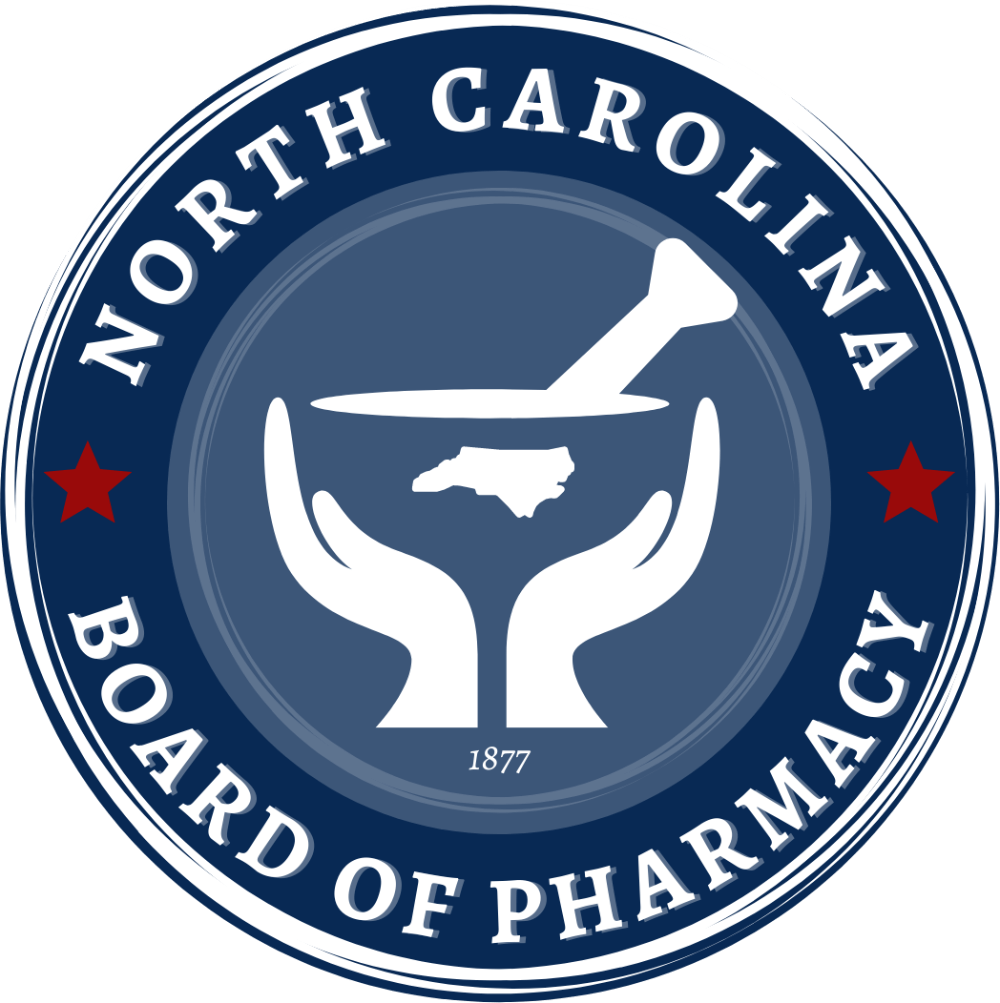
LICENSURE GATEWAY
The Gateway is a single portal to manage licenses, permits, and registrations with the North Carolina Board of Pharmacy. Access printable documents, update information, submit applications, and more.
Click Here-

GOVERNOR DECLARES STATE OF EMERGENCY IN COUNTIES AFFECTED BY TROPICAL STORM CHANTAL
Governor Stein has declared a state of emergency in the following counties to support recovery efforts from Chantal-caused flooding: Alamance, Caswell, Chatham, Davidson, Durham, Forsyth, Guilford, Lee, Moore, Orange, Person, Randolph, and Wake. Pharmacists and pharmacies are reminded that the Board of Pharmacy has exercised its authority under G.S. 90-85.25(a) to waive certain requirements of the North Carolina Pharmacy Practice Act to facilitate the provision of patient care during a declared emergency. [more below]
More information
-

STATEWIDE PHARMACIST STANDING ORDERS UPDATED TO REFLECT NEW STATE HEALTH DIRECTOR
The North Carolina State Health Director’s Epinephrine Auto Injector Standing Order and the North Carolina Standing Order for Opioid Antagonists have been resigned by new State Health Director Dr. Larry Greenblatt.
Read more
Pharmacists are reminded that the statewide protocols under which qualified pharmacists may initiate nicotine replacement therapy, self-administered hormonal contraceptives, prenatal vitamins, post-HIV exposure prophylaxis, and glucagon are not standing orders from the State Health Director. [more info and links below]
-

UPCOMING ELECTION - SOUTHEASTERN DISTRICT CANDIDATE INTEREST FORUM AUGUST 5, 2025
The next Board election will begin on November 1, 2025 and will be for the Southeastern district position, presently held by Robert (Joey) McLaughlin of Trenton, NC. The winner of this election will begin their term on May 1, 2026. Board staff will host a candidate interest forum on Tuesday, August 5 at the Embassy Suites by Hilton Fayetteville/Fort Bragg. Follow this link for more details.
Board Election - SE District -

NORTH CAROLINA CLASS C DRIVERS LICENSE EXTENSION AND IDENTIFICATION FOR CONTROLLED SUBSTANCE DISPENSING
North Carolina law (G.S. 90-106.1) requires that a pharmacy obtain a qualifying identification prior to dispensing certain controlled substances. With respect to a qualifying identification, the statute requires that it be “valid” and “unexpired.” On July 1, 2025, Governor Stein signed into law S.L. 2025-47 and section 18 of that law states: “Notwithstanding . . . any other State law to the contrary, a Class C regular drivers license shall remain valid for purposes of establishing the license holder’s driving privilege for a period of up to two years after its expiration. [continued below]
Continued below
-

PERIODIC REVIEW OF NC BOARD OF PHARMACY RULES - COMMENT PERIOD OPEN
Every decade, the Administrative Procedure Act requires each state board or agency to review its rules to determine if they remain necessary or are unnecessary. As to the necessary rules, the boards are to determine whether those rules are required to implement or conform to federal law. The Board has proposed determinations as to its existing rules. Please follow the link below which contains a listing of the rules, instructions on how to submit comments, and the comment submission deadline.
RULE REVIEW DETAILS -

NC DHHS PROPOSES AMENDMENTS TO ITS RULE GOVERNING CONTROLLED SUBSTANCE DISPOSAL FROM NURSING HOMES
NC DHHS’ Commission for Mental Health, Developmental Disabilities, and Substance Abuse Services (Commission) has proposed to amend, via permanent procedures, Rule 10A NCAC 26E .0406, Disposal of Unused Controlled Substances from Nursing Home. The Commission also proposes to adopt, via permanent procedures, Rule 10A NCAC 27G .3605, Medication Units and Mobile Units.
Read more below
-

DEA DELAYS EFFECTIVE DATE OF TWO NEW RULES CONCERNING PRESCRIBING CONTROLLED SUBSTANCES VIA TELEMEDICINE
The Drug Enforcement Administration has delayed the effective date of two final rules titled “Expansion of Buprenorphine Treatment via Telemedicine Encounter” and “Continuity of Care via Telemedicine for Veterans Affairs Patients” to December 31, 2025. [more below]
Read More
-

FDA ISSUES CLARIFYING STATEMENTS AND DEADLINES ON GLP-1 COMPOUNDING
A federal litigation brought by the Outsourcing Facilities Association challenged FDA’s determinations that GLP-1 shortages have ended. On March 5, 2025, the federal district court overseeing the litigation denied the Outsourcing Facilities Association’s request for a preliminary injunction to bar the FDA from declaring an end to the shortages. [more below]
Read More
-
BOARD INTRODUCES CHANGES TO THE TRANSFER-OF-OWNERSHIP PHARMACY PERMITTING PROCESS TO BETTER FACILITATE CONTINUITY OF OPERATIONS

Board Rule .1603 requires a pharmacy to obtain a new permit prior to the closing of a qualifying transfer-of-ownership transaction. A continuity of operations challenge in the transfer-of-ownership context frequently arises, however. Board staff has programmed changes to the transfer-of-ownership process whereby, after a review of a transfer-of-ownership application is completed and approved, the new pharmacy’s permit number is assigned provisionally. The pharmacy may use the permit number to complete continuity of operations tasks. [more below]
Read More
-

IN COORDINATION WITH THE NC PROFESSIONALS HEALTH PROGRAM
The NCBOP and NCPHP established the L. Stanley Haywood Recovery Fund in 2018. It provides financial support to qualifying pharmacy personnel in need of substance use assessment, treatment, and monitoring services. Learn more about donating or applying for assistance.
Read More -

NC BOARD OF PHARMACY YOUTUBE CHANNEL
Board meetings are live-streamed and past meetings are archived here.
Subscribe Now
-

NCBOP Rulemaking Notice: Proposed Amendments to 21 NCAC 46 .1401 and .1415
A public hearing will be held at 9:30AM on Tuesday, July 9, 2024 at the Board’s office to consider these changes.
Read More -

INVESTIGATOR/INSPECTOR POSITION OPEN AT THE NORTH CAROLINA BOARD OF PHARMACY
The NC Board of Pharmacy has an opening for an Inspector/Investigator in southwestern North Carolina. Follow this link for details about the position. Anyone wishing to apply should send a resume and cover letter of interest to Rhonda Jones, Director of Finance and Human Resources, rjones@ncbop.org.
Position Description
Latest News
Looking for an archived news item? Use the global site search at the top of this page to enter keyword(s).
-
GOVERNOR DECLARES STATE OF EMERGENCY IN COUNTIES AFFECTED BY TROPICAL STORM CHANTAL
JULY 17, 2025
Governor Stein has declared a state of emergency in the following counties to support recovery efforts from Chantal-caused flooding: Alamance, Caswell, Chatham, Davidson, Durham, Forsyth, Guilford, Lee, Moore, Orange, Person, Randolph, and Wake.
Pharmacists and pharmacies are reminded that the Board of Pharmacy has exercised its authority under G.S. 90-85.25(a) to waive certain requirements of the North Carolina Pharmacy Practice Act to facilitate the provision of patient care during a declared emergency. The Board’s emergency waiver is now in effect for these counties and is found here. The waiver authorizes relocations of pharmacies as needed to provide continuity of care. Certain notifications to the Board are required. The referenced notification email address – emergency@ncbop.org – is open.
Pharmacies that need to adjust operating hours as a result of the Chantal flooding are not required to report those adjustments under the Board’s emergency closure rule .2516. More info on that rule’s operation is found here.
EMERGENCY REFILL AUTHORIZATION. Board Rule .1815 authorizes pharmacists and DME providers to provide a one-time emergency refill of up to a 90-day supply when the pharmacist or DME provider is unable to obtain refill authorization from the prescriber due to the prescriber’s inability to provide medical services to the patient. This authority was specifically created for times of emergency like those in central North Carolina. Pharmacists and DME providers are encouraged to use it to assist patients in affected counties. The NC Department of Insurance has reminded health benefit plans of compliance requirements for operations under a state of emergency for purposes of obtaining extra prescriptions during a state of emergency or disaster.
-
STATEWIDE PHARMACIST STANDING ORDERS UPDATED TO REFLECT NEW STATE HEALTH DIRECTOR
JULY 16, 2025
The North Carolina State Health Director’s Epinephrine Auto Injector Standing Order and the North Carolina Standing Order for Opioid Antagonists (found here) have been resigned by new State Health Director Dr. Larry Greenblatt.
Pharmacists are reminded that the statewide protocols under which qualified pharmacists may initiate nicotine replacement therapy, self-administered hormonal contraceptives, prenatal vitamins, post-HIV exposure prophylaxis, and glucagon are not standing orders from the State Health Director. A qualified pharmacist exercising authority under these protocols must use the pharmacist’s/pharmacy’s NPI number for tracking and billing. More information on this protocol authority is found here.
-
NORTH CAROLINA CLASS C DRIVERS LICENSE EXTENSION AND IDENTIFICATION FOR CONTROLLED SUBSTANCE DISPENSING
JULY 9, 2025
North Carolina law (G.S. 90-106.1) requires that a pharmacy obtain a qualifying identification prior to dispensing certain controlled substances. Full detail on that requirement and its application to various scenarios is found here. With respect to a qualifying identification, the statute requires that it be “valid” and “unexpired.” G.S. 90-106.1(a).
On July 1, 2025, Governor Stein signed into law S.L. 2025-47. Section 18 of that law states: “Notwithstanding . . . any other State law to the contrary, a Class C regular drivers license shall remain valid for purposes of establishing the license holder’s driving privilege for a period of up to two years after its expiration. The section shall not apply to any drivers license that is currently canceled, revoked, or suspended.” The extension applies to “Class C regular drivers licenses that expire on of after [the statute’s effective date of July 1, 2025]” and the extension “expires December 31, 2027.”
Therefore, under the plain language of S.L. 2025-47, any (non-canceled, non-revoked, non-suspended) Class C North Carolina drivers license whose printed expiration date falls on or after July 1, 2025 is “valid” and “unexpired” through December 31, 2027. As such, it may be used for dispensing controlled substances under G.S. 90-106.1 – as well as any other pharmacy activities that require production of a valid, unexpired identification.
-
NORTH CAROLINA CONFIRMS MEASLES CASE; NC DHHS ISSUES PROVIDER MEMO
june 27, 2025
On June 24, 2025, NC DHHS confirmed the first measles case in North Carolina in 2025. A child who was visiting Forsyth and Guilford counties became ill while visiting from another country where measles outbreaks have been reported. You may have been exposed if you visited one of these Kernersville or Greensboro locations between June 19 and June 22. If you visited one of these locations during that timeframe, review your immunization records or contact your health care provider to make sure you are up to date on the measles-mumps-rubella (MMR) vaccine.
Prompt recognition, reporting, and investigation of measles cases is important because spread of the disease can be limited with early case identification and vaccination or quarantine of susceptible contacts. Please see this memo on measles reporting, testing, and vaccination. Additional materials for providers will be available in the coming days. Please check the NC DHHS Measles Page for the latest information and materials.
NCDHHS is recommending all unvaccinated people who are 1 year and older receive the measles vaccination to protect themselves and those around them. This contagious disease can lead to serious complications. It's dangerous for babies and children, and during pregnancy. Children who are not vaccinated are at the highest risk.
Go to the Division of Public Health's website to find out more about how to protect yourself and others, and how NCDHHS is preparing for potential outbreaks.
NCDHHS recently launched a Vaccines for Children and Teens webpage to help parents get answers to their questions, understand vaccine requirements and recommendations for schools and child care facilities, and more.
The Vaccines for Children (VFC) program helps eligible families get free vaccines. The VFC webpage includes an interactive provider map to connect families with local providers who offer free childhood vaccines for eligible children and teens.
-
NC DHHS PROPOSES AMENDMENTS TO ITS RULE GOVERNING CONTROLLED SUBSTANCE DISPOSAL FROM NURSING HOMES
JUNE 16, 2025
NC DHHS’ Commission for Mental Health, Developmental Disabilities, and Substance Abuse Services (Commission) has proposed to amend, via permanent procedures, Rule 10A NCAC 26E .0406, Disposal of Unused Controlled Substances from Nursing Home. The Commission also proposes to adopt, via permanent procedures, Rule 10A NCAC 27G .3605, Medication Units and Mobile Units. Both proposed rules are available at the Commission for MH/DD/SAS Proposed Rules page.
The public comment period for both rules runs June 17, 2025, through August 15, 2025. Written comments to the proposed rule must be submitted electronically to dmhddsasrules@dhhs.nc.gov or mailed to W. Denise Baker 3001 Mail Service Center Raleigh, NC 27699-3001.
-
PHARMACY AND MEDICAL BOARDS APPROVE SLIGHT CHANGES TO STATEWIDE PHARMACIST-INITIATED HORMONAL CONTRACEPTIVE PROTOCOL
june 11, 2025
Effective May 20, 2025, the Pharmacy and Medical Boards approved slight changes to the statewide protocol governing pharmacist initiation of hormonal contraceptive therapy. The revised protocol is found here. The North Carolina Association of Pharmacists’ Hormonal Contraceptive Toolkit (https://www.ncpharmacists.org/hormonal-contraception-toolkit) has been updated to reflect these changes, and NCAP has produced an excellent short video explaining the changes (https://www.youtube.com/watch?v=WGTgLL79a7Q). Broader guidance on qualifying immunizing pharmacists’ authority to initiate certain drug therapy is found here in the Board website’s FAQ section.
-
*ALERT* PHARMACISTS AND PHARMACY PERSONNEL WARNED OF SCAM COMMUNICATIONS PURPORTING TO BE FROM NCBOP STAFF
april 17, 2025
Don’t fall victim to scammers! Pharmacists continue to report receiving calls from individuals purporting to be Board investigators/inspectors. The Board’s telephone number, (919) 246-1050, is often what appears on caller ID. Such calls as of late inform the pharmacist that they are the target of an investigation involving illegal drug activity and the caller sometimes claims to be part of a larger FBI (or SBI, DEA or other agency) investigation. The details and the names of the “investigator” vary, but these calls appear to be an attempt to get the recipient to disclose personal information.
Board staff reminds practitioners that the names of all the Board’s investigators are listed on the NCBOP’s website, and if they are unsure or suspicious when contacted by someone claiming to be a Board staff member (whether by phone, email, or other communication) that they should contact the Board immediately. To be sure, Board staff frequently contact pharmacists and pharmacy staff on all manner of issues. But, again, if you are suspicious about the true identity of the caller, please reach out to the Board office directly.
-
DEA DELAYS EFFECTIVE DATE OF TWO NEW RULES CONCERNING PRESCRIBING CONTROLLED SUBSTANCES VIA TELEMEDICINE
APRIL 4, 2025
The Drug Enforcement Administration has delayed the effective date of two final rules titled “Expansion of Buprenorphine Treatment via Telemedicine Encounter” and “Continuity of Care via Telemedicine for Veterans Affairs Patients” to December 31, 2025. More information found here: https://www.federalregister.gov/documents/2025/03/24/2025-05007/expansion-of-buprenorphine-treatment-via-telemedicine-encounter-and-continuity-of-care-via
As a result of this delay, The Third Temporary Extension of COVID-19 Telemedicine Flexibilities for Prescription of Controlled Medications (https://www.federalregister.gov/documents/2024/11/19/2024-27018/third-temporary-extension-of-covid-19-telemedicine-flexibilities-for-prescription-of-controlled) remains in effect and continues to allow practitioners to prescribe controlled substances via telemedicine through December 31, 2025.
-
FDA ISSUES CLARIFYING STATEMENTS AND DEADLINES ON GLP-1 COMPOUNDING
MARCH 25, 2025
A federal litigation brought by the Outsourcing Facilities Association challenged FDA’s determinations that GLP-1 shortages have ended. On March 5, 2025, the federal district court overseeing the litigation denied the Outsourcing Facilities Association’s request for a preliminary injunction to bar the FDA from declaring an end to the shortages.
On December 19, 2024, FDA issued a statement that that it would exercise enforcement discretion and not take action concerning compounded tirzepatide while the litigation was pending. With the litigation’s end, compounding copies of approved tirzepatide products is no longer allowed.
On February 21, 2025, FDA issued a statement concerning compounded semaglutide products. FDA has determined that shortages of semaglutide injection products have resolved. To avoid unnecessary disruption to patient treatment, FDA announced that it would not take action against compounders for violations of the Food and Drug Cosmetic Act until the following dates:
-
For state-licensed 503A compounding pharmacies, sixty (60) days from the February 21 statement – April 22, 2025.
-
For 503B outsourcing facilities, ninety (90) days from the February 21 statement – May 22, 2025.
For more details, please see: FDA clarifies policies for compounders as national GLP-1 supply begins to stabilize | FDA
-
-
BOARD INTRODUCES CHANGES TO THE TRANSFER-OF-OWNERSHIP PHARMACY PERMITTING PROCESS TO BETTER FACILITATE CONTINUITY OF OPERATIONS
MARCH 19, 2025
Board Rule .1603 requires a pharmacy to obtain a new permit prior to the closing of a qualifying transfer-of-ownership transaction. Comprehensive information and instruction on the transfer-of-ownership process – and the consequences of not following the process – are found in the FAQs located here. A continuity of operations challenge in the transfer-of-ownership context frequently arises, however. The new pharmacy needs to have a permit number assigned to complete tasks such as DEA registration transfer and enrollment with third-party payor programs. To date, the new pharmacy permit number was not assigned until the close of the transfer-of-ownership transaction, creating a possibility that the new pharmacy would have to delay operations until these tasks were completed. Board staff has programmed changes to the transfer-of-ownership process whereby, after a review of a transfer-of-ownership application is completed and approved, the new pharmacy’s permit number is assigned provisionally. The pharmacy may use the permit number to complete continuity of operations tasks. Once the transfer-of-ownership application closes, the “provisional” status is removed and the new pharmacy may begin practice under that permit number. This guidance explains the what, why, and how of the revised process.
-
NIOSH RELEASES UPDATED LIST OF HAZARDOUS DRUGS IN HEALTH CARE SETTINGS
MARCH 11, 2025
On December 19, 2024, the CDC: National Institute for Occupational Safety and Health (NIOSH) released its updated 2024 list of Hazardous Drugs in Healthcare Settings. This list is designed to assist employers in identifying drugs that are hazardous to the health and safety of workers who handle these drugs. The new list can be found here: NIOSH 2024.
For rules and guidance concerning USP chapter <800> operation in compounding and non-compounding operations, see FAQs here: https://www.ncbop.org/faqs/general-pharmacy-faqs.html#faqcompounding